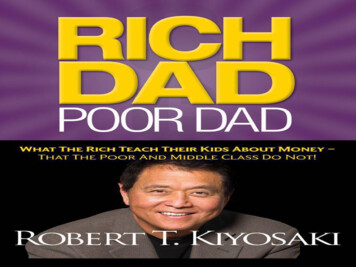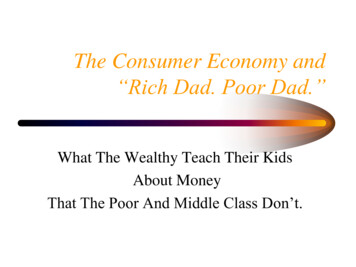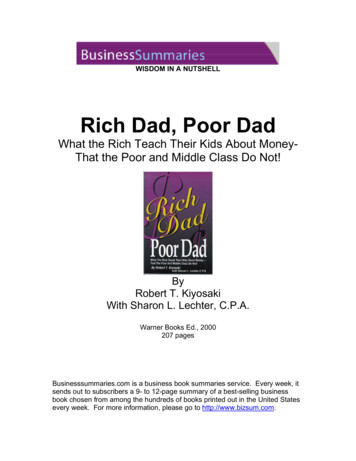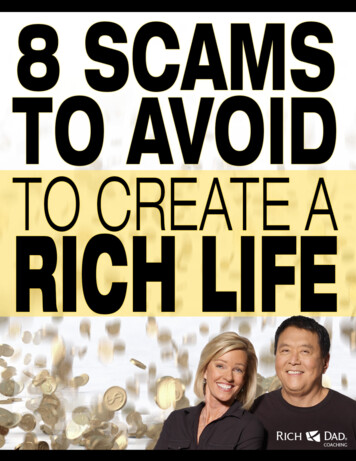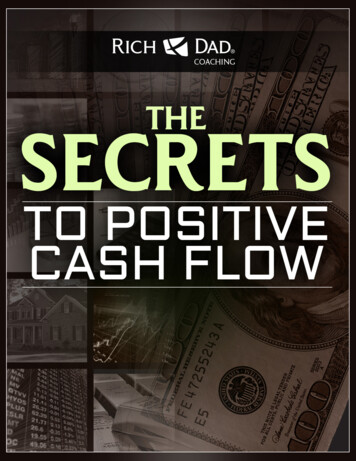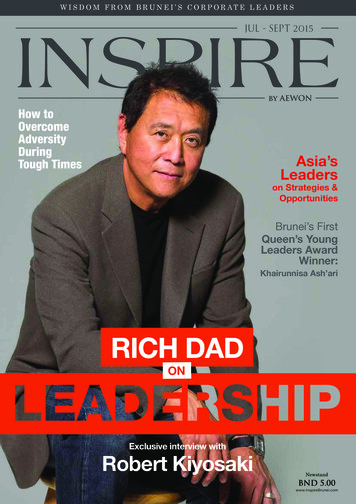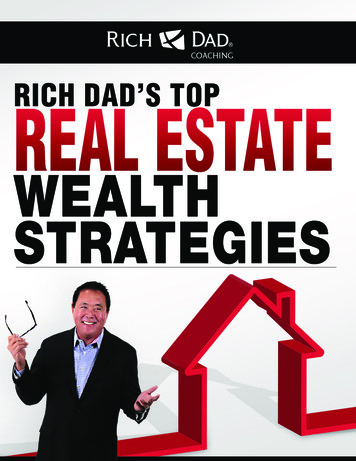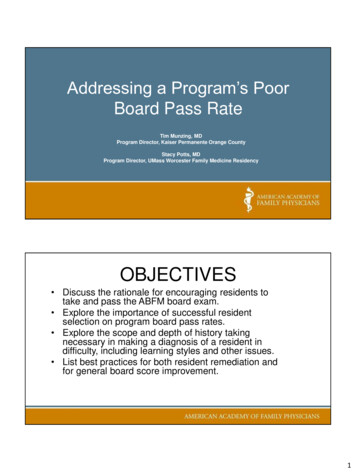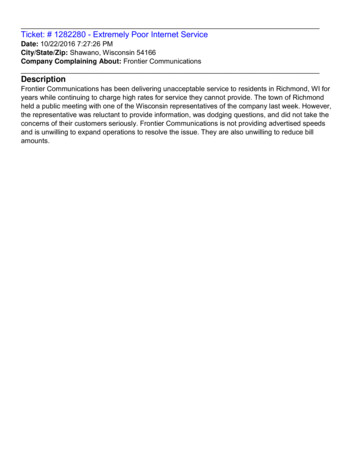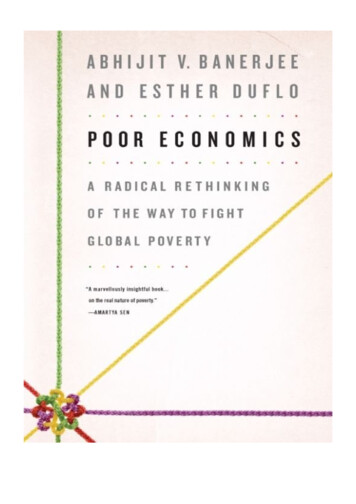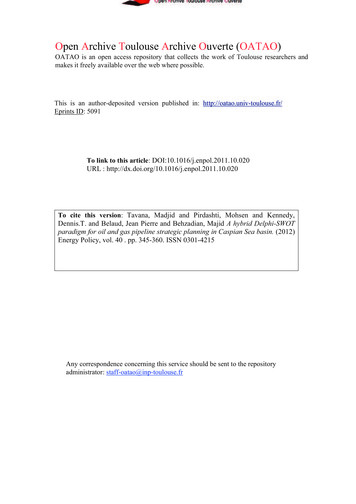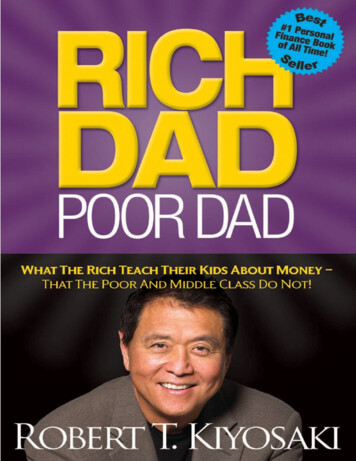
Transcription
“Rich Dad Poor Dad is a starting point for anyonelooking to gain control of their financial future.”– USA TODAY
If you purchase this book without a cover, or purchase a PDF, jpg, or tiff copyof this book, it is likely stolen property or a counterfeit. In that case, neitherthe authors, the publisher, nor any of their employees or agents has receivedany payment for the copy. Furthermore, counterfeiting is a known avenue offinancial support for organized crime and terrorist groups. We urge you toplease not purchase any such copy and to report any instance of someoneselling such copies to Plata Publishing LLC.This publication is designed to provide competent and reliable informationregarding the subject matter covered. However, it is sold with theunderstanding that the author and publisher are not engaged in renderinglegal, financial, or other professional advice. Laws and practices often varyfrom state to state and country to country and if legal or other expertassistance is required, the services of a professional should be sought. Theauthor and publisher specifically disclaim any liability that is incurred fromthe use or application of the contents of this book.Copyright 2011 by CASHFLOW Technologies, Inc. All rights reserved.Except as permitted under the U.S. Copyright Act of 1976, no part of thispublication may be reproduced, distributed, or transmitted in any form or byany means or stored in a database or retrieval system, without the priorwritten permission of the publisher.Published by Plata Publishing, LLCCASHFLOW, Rich Dad, Rich Dad Advisors, ESBI, and are registeredtrademarks of CASHFLOW Technologies, Inc.are registered trademarks of CASHFLOWTechnologies, Inc.Plata Publishing, LLC4330 N. Civic Center PlazaSuite 100Scottsdale, AZ 85251(480) 998-6971Visit our websites: PlataPublishing.com and RichDad.comFirst Edition: 1997First Plata Publishing Edition: March 2011032014
ISBN: 978-1-61268-018-7Cover photo credit: Seymour & Brody Studio
BEST-SELLING BOOKSBY ROBERT T. KIYOSAKIRich Dad Poor DadWhat the Rich Teach Their Kids About Money – That the Poor and MiddleClass Do NotRich Dad’s CASHFLOW QuadrantGuide to Financial FreedomRich Dad’s Guide to InvestingWhat the Rich Invest in That the Poor and Middle Class Do NotRich Dad’s Rich Kid Smart KidGive Your Child a Financial Head StartRich Dad’s Retire Young Retire RichHow to Get Rich and Stay RichRich Dad’s ProphecyWhy the Biggest Stock Market Crash in History Is Still Coming And How You Can Prepare Yourself and Profit from It!Rich Dad’s Success StoriesReal-Life Success Stories from Real-Life People Who Followed the Rich DadLessonsRich Dad’s Guide to Becoming Rich Without Cutting Up Your CreditCardsTurn Bad Debt into Good DebtRich Dad’s Who Took My Money?Why Slow Investors Lose and Fast Money Wins!Rich Dad Poor Dad for TeensThe Secrets About Money – That You Don’t Learn In School!Escape the Rat RaceLearn How Money Works and Become a Rich KidRich Dad’s Before You Quit Your JobTen Real-Life Lessons Every Entrepreneur Should Know About Building aMultimillion-Dollar BusinessRich Dad’s Increase Your Financial IQGet Smarter with Your MoneyRobert Kiyosaki’s Conspiracy of the RichThe 8 New Rules of MoneyUnfair AdvantageThe Power of Financial Education
Why “A” Students Work for “C” StudentsRich Dad’s Guide to Financial Education for Parents
To parents everywhere, a child’s first and most importantteachers, and to all those who educate, influence, and leadby example
AcknowledgmentsHow does a person say “thank you” when there areso many people to thank? Obviously this book is athank you to my two fathers, who were powerful rolemodels, and to my mom, who taught me love andkindness.The person most responsible for this bookbecoming a reality is my wife Kim—my partner inmarriage, business, and in life. She makes my lifecomplete.
ContentsIntroductionRich Dad Poor DadChapter OneLesson 1: The Rich Don’t Work for MoneyChapter TwoLesson 2: Why Teach Financial Literacy?Chapter ThreeLesson 3: Mind Your Own BusinessChapter FourLesson 4: The History of Taxes and the Power ofCorporationsChapter FiveLesson 5: The Rich Invent MoneyChapter SixLesson 6: Work to Learn—Don’t Work for MoneyChapter SevenOvercoming ObstaclesChapter EightGetting Started
Chapter NineStill Want More? Here Are Some To Do’sFinal Thoughts
IntroductionRICH DAD POOR DADHaving two dads offered me the choice ofcontrasting points of view: one of a rich manand one of a poor man.I had two fathers, a rich one and a poor one. One washighly educated and intelligent. He had a Ph.D. andcompleted four years of undergraduate work in less thantwo years. He then went on to Stanford University, theUniversity of Chicago, and Northwestern University to dohis advanced studies, all on full financial scholarships. Theother father never finished the eighth grade.Both men were successful in their careers, working hardall their lives. Both earned substantial incomes. Yet onealways struggled financially. The other would become one ofthe richest men in Hawaii. One died leaving tens of millionsof dollars to his family, charities, and his church. The otherleft bills to be paid.Both men were strong, charismatic, and influential. Bothmen offered me advice, but they did not advise the samethings. Both men believed strongly in education but did notrecommend the same course of study.If I had only one dad, I would have had to accept orreject his advice. Having two dads offered me the choice of
contrasting points of view: one of a rich man and one of apoor man.Instead of simply accepting or rejecting one or the other,I found myself thinking more, comparing, and thenchoosing for myself. The problem was that the rich man wasnot rich yet, and the poor man was not yet poor. Both werejust starting out on their careers, and both were strugglingwith money and families. But they had very different pointsof view about money.For example, one dad would say, “The love of money isthe root of all evil.” The other said, “The lack of money isthe root of all evil.”As a young boy, having two strong fathers bothinfluencing me was difficult. I wanted to be a good son andlisten, but the two fathers did not say the same things. Thecontrast in their points of view, particularly about money,was so extreme that I grew curious and intrigued. I beganto start thinking for long periods of time about what eachwas saying.Much of my private time was spent reflecting, askingmyself questions such as, “Why does he say that?” and thenasking the same question of the other dad’s statement. Itwould have been much easier to simply say, “Yeah, he’sright. I agree with that.” Or to simply reject the point ofview by saying, “The old man doesn’t know what he’stalking about.” Instead, having two dads whom I lovedforced me to think and ultimately choose a way of thinkingfor myself. As a process, choosing for myself turned out tobe much more valuable in the long run than simplyaccepting or rejecting a single point of view.One of the reasons the rich get richer, the poor getpoorer, and the middle class struggles in debt is that thesubject of money is taught at home, not in school. Most of uslearn about money from our parents. So what can poorparents tell their child about money? They simply say, “Stayin school and study hard.” The child may graduate with
excellent grades, but with a poor person’s financialprogramming and mindset.Sadly, money is not taught in schools. Schools focus onscholastic and professional skills, but not on financial skills.This explains how smart bankers, doctors, and accountantswho earned excellent grades may struggle financially all oftheir lives. Our staggering national debt is due in large partto highly educated politicians and government officialsmaking financial decisions with little or no training in thesubject of money.Today I often wonder what will soon happen when wehave millions of people who need financial and medicalassistance. They will be dependent upon their families orthe government for financial support. What will happenwhen Medicare and Social Security run out of money? Howwill a nation survive if teaching children about moneycontinues to be left to parents—most of whom will be, oralready are, poor?Because I had two influential fathers, I learned fromboth of them. I had to think about each dad’s advice, and indoing so, I gained valuable insight into the power and effectof one’s thoughts on one’s life. For example, one dad had ahabit of saying, “I can’t afford it.” The other dad forbadethose words to be used. He insisted I ask, “How can I affordit?” One is a statement, and the other is a question. One letsyou off the hook, and the other forces you to think. My soonto-be-rich dad would explain that by automatically sayingthe words “I can’t afford it,” your brain stops working. Byasking the question “How can I afford it?” your brain is putto work. He did not mean that you should buy everythingyou want. He was fanatical about exercising your mind, themost powerful computer in the world. He’d say, “My braingets stronger every day because I exercise it. The strongerit gets, the more money I can make.” He believed thatautomatically saying “I can’t afford it” was a sign of mentallaziness.
Although both dads worked hard, I noticed that one dadhad a habit of putting his brain to sleep when it came tofinances, and the other had a habit of exercising his brain.The long-term result was that one dad grew strongerfinancially, and the other grew weaker. It is not muchdifferent from a person who goes to the gym to exercise ona regular basis versus someone who sits on the couchwatching television. Proper physical exercise increases yourchances for health, and proper mental exercise increasesyour chances for wealth.My two dads had opposing attitudes and that affectedthe way they thought. One dad thought that the rich shouldpay more in taxes to take care of those less fortunate. Theother said, “Taxes punish those who produce and rewardthose who don’t produce.”One dad recommended, “Study hard so you can find agood company to work for.” The other recommended,“Study hard so you can find a good company to buy.”One dad said, “The reason I’m not rich is because I haveyou kids.” The other said, “The reason I must be rich isbecause I have you kids.”One encouraged talking about money and business atthe dinner table, while the other forbade the subject ofmoney to be discussed over a meal.One said, “When it comes to money, play it safe. Don’ttake risks.” The other said, “Learn to manage risk.”One believed, “Our home is our largest investment andour greatest asset.” The other believed, “My house is aliability, and if your house is your largest investment, you’rein trouble.”Both dads paid their bills on time, yet one paid his billsfirst while the other paid his bills last.One dad believed in a company or the governmenttaking care of you and your needs. He was alwaysconcerned about pay raises, retirement plans, medicalbenefits, sick leave, vacation days, and other perks. He was
impressed with two of his uncles who joined the militaryand earned a retirement-and-entitlement package for lifeafter twenty years of active service. He loved the idea ofmedical benefits and PX privileges the military provided itsretirees. He also loved the tenure system available throughthe university. The idea of job protection for life and jobbenefits seemed more important, at times, than the job. Hewould often say, “I’ve worked hard for the government, andI’m entitled to these benefits.”The other believed in total financial self-reliance. Hespoke out against the entitlement mentality and how itcreated weak and financially needy people. He wasemphatic about being financially competent.One dad struggled to save a few dollars. The othercreated investments. One dad taught me how to write animpressive resumé so I could find a good job. The othertaught me how to write strong business and financial plansso I could create jobs.Being a product of two strong dads allowed me theluxury of observing the effects different thoughts have onone’s life. I noticed that people really do shape their livesthrough their thoughts.For example, my poor dad always said, “I’ll never berich.” And that prophecy became reality. My rich dad, onthe other hand, always referred to himself as rich. He wouldsay things like, “I’m a rich man, and rich people don’t dothis.” Even when he was flat broke after a major financialsetback, he continued to refer to himself as a rich man. Hewould cover himself by saying, “There is a differencebetween being poor and being broke. Broke is temporary.Poor is eternal.”My poor dad would say, “I’m not interested in money,” or“Money doesn’t matter.” My rich dad always said, “Money ispower.”The power of our thoughts may never be measured orappreciated, but it became obvious to me as a young boy
that it was important to be aware of my thoughts and how Iexpressed myself. I noticed that my poor dad was poor, notbecause of the amount of money he earned, which wassignificant, but because of his thoughts and actions. As ayoung boy having two fathers, I became acutely aware ofbeing careful about which thoughts I chose to adopt as myown. Should I listen to my rich dad or to my poor dad?There is a difference between being poor andbeing broke. Broke is temporary. Poor iseternal.Although both men had tremendous respect foreducation and learning, they disagreed about what theythought was important to learn. One wanted me to studyhard, earn a degree, and get a good job to earn money. Hewanted me to study to become a professional, an attorneyor an accountant, and to go to business school for my MBA.The other encouraged me to study to be rich, to understandhow money works, and to learn how to have it work for me.“I don’t work for money!” were words he would repeat overand over. “Money works for me!”At the age of nine, I decided to listen to and learn frommy rich dad about money. In doing so, I chose not to listento my poor dad, even thoug
“Rich Dad Poor Dad is a s t a rt in g p o in t f o r a n y o n e lo o kin g t o g a in c o n t ro l o f t h e ir fin a n c ia l f u t u re .” – USA TODAY. I f you p u rch a s e th i s b ook w i th ou t a cove r, or p u rch a s e a PDF, j p g , or ti ff cop y of th i s b ook, i t i s l i ke l y s tol e n p rop e rty or a cou n te rf e i t. I n th a t ca s e , n e i th e r th e a u th .
